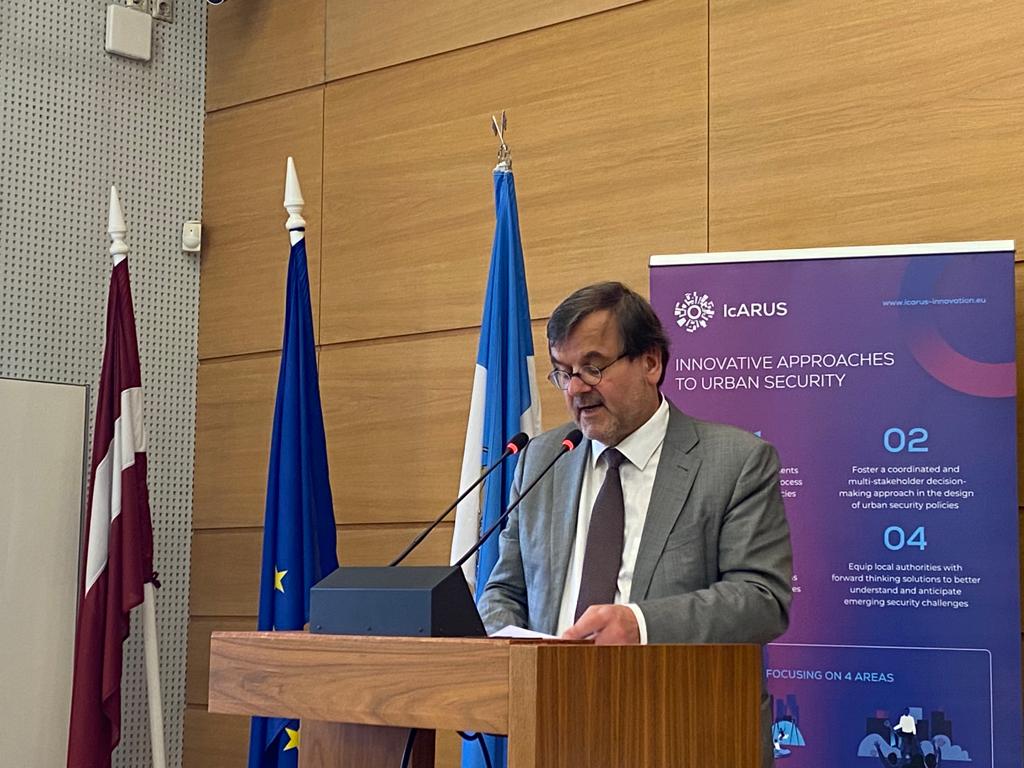December 2024 –Tilburg (pop. 220,000) is the Netherlands’ seventh largest city. Situated in the south of the country close to the Belgian border and linked to northern Europe’s main ports and narcotraffic centres, such as Rotterdam, Amsterdam, Antwerp, Utrecht and the north of France, it has become in the past decade a drugs hub, with serious consequences on the local social fabric.
The Tilburg City Council is very much aware of that situation and, as part of its comprehensive crime prevention strategy, it has developed a scheme to nudge young people from what it calls ‘crime families’ away from trafficking and crime. Titled Breaking the Cycle, the scheme has been going on for over four years and is designed to last up to 10 years or more.
We’ve met with the three municipal officers in charge of this programme: Huub Vissers, Strategic Security Advisor, Iris Hoedemaekers, Security Specialist and Breaking the Cycle project leader, and Rik Ceulen, Criminologist.

From left to right: Rik Ceulen, Huub Vissers and Iris Hoedemaekers.
How has the municipality of Tilburg come to identify what you call ‘crime families’?
Rik Ceulen: It started about six years ago. We kept seeing the same families repeatedly identified by police as having several members engaging in criminal activities, mainly but not exclusively linked to drugs. We are conscious that speaking of ‘crime families’ can raise eyebrows, but such families really do exist. They are involved in criminal networks, and criminal behaviour is transmitted from parents to children, or among siblings.
How do you know they’re involved in organised crime?
Iris Hoedemaekers: As a municipality, we receive a lot of information on drug operations, for example when clandestine labs are shut down, We work together with police, and they inform us on the activities of these families. All this information led us to identify the existence of about 30-50 families living in certain neighbourhoods in the north, south and west of Tilburg who are directly involved in forms of organised crime. But there are a lot more families that are involved to a lesser extent that meet our inclusion criteria.
How did the idea of Breaking the Cycle come about?
Rik Ceulen: We based our idea roughly on the approach followed by the city of Maastricht when working with crime families. We customised this to our specific needs and the context of Tilburg. We developed the scheme as an exit-programme for families who want to build a regular life outside the criminal world and therefore work together with members of these families as part of our overall preventive approach.
Huub Vissers: Indeed, Breaking the Cycle is part of a larger crime prevention programme, titled Prevention with Authority, which itself is part of the overall National Liveability and Safety Programme. Many cities in the Netherlands have vulnerable suburbs marred by drug problems, including drug-linked fatalities. As traditional approaches don’t bring about much change, we started thinking that we should target young people and encourage them to desist or refrain from joining criminal groups by improving their lives in every possible aspect. Many youngsters from deprived neighbourhoods feel they have no choice. They don’t know anything better and often are under pressure from their peers and from organised crime’s ‘recruiters’. The idea is to show them that choosing the right path can bring rewards. Breaking the Cycle is just one among various projects that are part of an overall local and national approach to crime and drugs.
Who are the families involved in the programme?
Rik Ceulen: The main criteria for including these families in the programme are:
– They are involved in serious forms of (organised) crime (mostly drug-related)
– There are children in the families
– There are concerns regarding safety, personal development and the upbringing of children
– Youngsters in the family are showing (delinquent) behaviour that indicates that they are following in the footsteps of criminal family members
– Families show intimidating behaviour in the neighbourhood
“Our three coaches accompany families very closely in all their needs and can be reached 24/7. They have the right skills, are highly motivated and are not afraid.”
How does the programme work?
Iris Hoedemaekers: We have three full time coaches, whom we recruited through our local network of partners. They are aged between 30 and 40 and have some background in social work. Two of them are men, one with a bicultural background and the other a former military officer, and one is a woman. Basically, they accompany families very closely in all their needs and can be reached 24/7. This is important because often, problems arise out of office hours.
Huub Vissers: They have the right skills; they are highly motivated, and they are not afraid.
How do families know about the existence of the Breaking the Cycle programme?
Iris Hoedemaekers: Usually, families are referred to us through community policing. When we start working with them, they have often already seen many social workers and are in deep trouble for one reason or another. This is when we intervene. A coach meets them and identifies their needs. From there, the coach builds relationships of trust, usually with the women of the family and more often than not when the father is away, for example because he’s in custody. We seize this kind of opportunity to ‘enter’ the family. We bring them all the social help we can in terms of jobs, social benefits, housing, etc., with the objective of protecting the children and showing them the ‘right path’ so they never join criminal groups. Throughout the programme, the coach remains their sole point of contact.
How long does a coach accompany a family?
Iris Hoedemaekers: We tell the family that we’ll help them as long as necessary, but usually each family is supported for about three to five years.
What other municipal services are involved?
Iris Hoedemaekers: We try to keep it as small as possible, notably to avoid risks linked to information sharing. We don’t share direct information about Breaking the Cycle with other municipal departments.
You said that families are accompanied for about three to five years, and that the programme is designed to last at least 10 more years. This means you need long-lasting political backing both at the local and national level. Is that the case?
Rik Ceulen: We’ve always had the political backing of Tilburg’s mayor. Also, we are having results: 25 families have so far been involved in the programme, and 80% of those, i.e., 92 individuals have successfully completed it. This means that they are sufficiently equipped to participate in society. This helps because the results speak for themselves.
Huub Vissers: Our national government is in favour of prevention as a well-founded approach to crime just as the previous government was. Also, the former government made a deal with Parliament that this approach can only succeed if it lasts at least 20 years.
“We’d be very interested in exchanging through Efus with cities from other countries and get to know how they approach the prevention of organised crime, and whether they run similar programmes.”
How do you measure the results of Breaking the Cycle?
Iris Hoedemaekers: Well, it’s a bit difficult because how do you measure crime that has not happened, or children who have not joined criminal groups? This said, we use a matrix, titled the Self Sufficiency Matrix, to monitor how self-sufficient an individual is in different aspects of life, such as housing, employment, education, finances, substance abuse, mental health, etc. Also, there was an external evaluation of the programme conducted by Tilburg University.
Huub Vissers: One of our objectives now is to see how Breaking the Cycle can be evidence-based, notably through our collaboration with the University.
Do you cooperate with other cities in the Netherlands and beyond on this approach?
Iris Hoedemaekers: We do receive a lot of questions from other Dutch cities, because many also deal with ‘criminal families’. They ask us not only about the programme itself, but also the funding. It is an expensive project, which is a part of a 2.3 million euros budget for crime prevention in Tilburg. This budget shows that we, and our government, take crime prevention very seriously.
Huub Vissers: Twenty-seven Dutch cities are working together with five ministries involved in the National Liveability and Safety Programme. They all work together for a long-term approach, and all are quite enthusiastic about it.
Rik Ceulen: Beyond the Netherlands, we met a couple of times with Irish colleagues who manage a similar programme, called Greentown. It is always very interesting to exchange with other cities: indeed, it is one of the reasons we are members of Efus.
Iris Hoedemaekers: We’d be very interested in exchanging through Efus with cities from other countries and get to know how they approach the prevention of organised crime, and whether they run similar programmes.
“It’s important to cooperate with knowledge institutions, whether universities or other organisations. We need each other: they need information based on practice, and we need their theoretical knowledge.”
What would be your message to Efus members or other local authorities dealing with similar issues as Tilburg?
Huub Vissers: Breaking the Cycle is an experiment that has had interesting results and which brings hope. We need to explore more and keep developing it. We hope we can inspire other local authorities, but we are also looking to be inspired by other approaches.
Iris Hoedemaekers: My main message would be that you need political backing from your local government to sustain such an approach in the long term, which means a guarantee that funding won’t be cut.
Rik Ceulen: I would say it’s important to cooperate with knowledge institutions, whether universities or other organisations. We need each other: they need information based on practice, and we need their theoretical knowledge. So don’t be afraid to knock on doors. Make room in your agenda to have a cup of coffee with academics and researchers: often, that’s how cooperation starts.
> Read the practice sheet on Breaking the Cycle (October 2024)
> More information on Efus’ activities on the issue of organised crime





